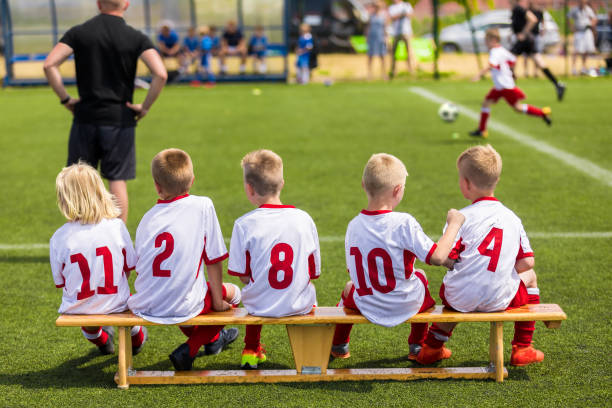|
It is the grassroots youth argument that has been discussed and argued since the beginning of man, or at least since youth football began, so let us get involved and give our point of view.
The answer of course is easy; there is no simple answer! You can only offer an opinion on the subject as there is no official rule or regulation in place, and each club is run differently and with a different philosophy and mentality. We are absolutely no different in that respect. Let us get an easy one out the way, mini soccer. With regards to U11’s and below there is really no reason at this age, in our opinion, as to why equal time cannot be implemented, within reason. However, if as a parent you think your child is getting less game time do not talk about the coach behind his back or moan about it. The reason for this is that most of the time there is a reason for your child not getting as much gametime. Speak to the Coach. Speak to your child. Having seen it in the past I have seen kids ask to come off or ask not to come on. There is nearly always a reason that you do not know about for a player getting less game time. Better to address this rather than come to unfounded assumptions. At the business end of U11’s I would say that players are starting to find their positions and competitiveness is starting to kick in and occasionally a coach may use discretion with game time, but on the whole good practice is sharing the time between the squad. It is a tough job for a coach switching players in and out of games. It affects the flow of the game, and you quite often have players playing out of position to make it fit, but at this age does that really matter? I have seen coaches spend hours creating the perfect substitution spreadsheet to make sure everyone gets gametime, only to see it go up in flames as a player is injured or arrives 5 minutes after KO. At this age it is all about fun and socialising, and we will always endeavour to do that. As a club, Phoenix Youth FC established itself in 2019 with three teams and 30 players. As of today, we are now at 9 teams (including three girls’ teams) and over 120 players. We did not plan for this to happen, but here we are. We did not build a football club; we built a philosophy built on our motto of Respect & Inclusion. Our plan from the outset was to try and offer equal gametime, but with best laid plans and all, we have had to adapt and evolve as we learnt about youth football and follow the curve. After all, everyone involved at the club is a volunteer who is learning and we are a not-for-profit club, despite being spoken down to as employees and a company on many occasions. Inclusion meant that we accepted players of all abilities, backgrounds, cultures, not only with the understanding that we would develop them as footballers, but as human beings. Football was purely the vehicle for that. As the club grew, we realised that Inclusion meant having to add more teams to fulfil the supply and demand. And so, we move on to U12’s and above. Competitive youth football. Now, this is where things got a little tricky with regards to equal playing time. These kids were far more self-aware of the individual standards of players in their own teams. They knew the stronger players and they knew the players with development needs. They also started new secondary schools and results and tables are published. For most coaches no big deal, but for the players a lot more at stake. Whether that be winning things or bragging rights in the school yard. Wrongly or rightly, depending on your point of view the coaches were left in a no-win position. Keep 11 players and parents happy and upset 1-2 by playing your strongest team for more time or keep the 1-2 happy and risk losing the strongest players to other teams. Of course, to you or I its still about enjoying your football and socialising with your friends, but ultimately at that age you still want to win games. That is not even an argument. There is also two sides of the coin to safeguarding at this age. Don’t play them and risk that player getting upset, and feeling excluded, or play them and risk the rest of the team getting on their backs and causing in-team arguments. For those of you out there saying “manage the behavior” of the other team members it’s not so straight forward when they have group chats and access to mobile phones. For us, we had to adapt to this model, and ultimately some players at this age started to get less playing time. We said from the outset to parents that we would always look to start our perceived strongest 11 and use other players when needed. OK, so the parent is paying the same subs, so why should they watch each week when their kid only gets 10 minutes at the end. We could argue that we charge half of most clubs out there and provide a lot more than just matchdays, but I get it, I have been there myself as a parent and whilst you are routing for the team you are ultimately there for your own child. The coach sees those faces on the side-lines and for any parents wondering, it is as hard for them as it is for you. I have seen coaches leaving their own kids on the subs bench because it is the “right thing” for the team. Though of course, the coach does not see the tears in the car on the journey home, but they are aware it happens. Growth was the only way we could continue to respect that philosophy that set us apart at the beginning, and so we offered players more teams, in different divisions. Players needing more development could play for a team in a lower division, and get more gametime, and players who needed to play in a higher league were also offered the opportunity, where possible. But of course, some of those players had been together for years, did they want to move? Sometimes they just wanted to be part of a team where they knew they would get less time but remain with their friends. In these cases, we have still tried to develop those players to be able to compete for positions and always, always, included them in everything club focused. So, in summary, should there be equal playing time for all youth players. The answer will never really be absolute, and as a parent you will always be on one side of the fence depending on whether your child gets playing time, or not. The only thing I know for sure is that every single one of our coaches is a volunteer. They put their own free time into coaching these kids and giving them the opportunity to play football. It is stressful for them and believe it or not it affects their mental health, especially when they see a player upset. They will always put the team first and try and do what is best for all players, both to develop them and to make them better people and make football as enjoyable as they can. #TeamGrassroots #GRF Grassroots Football UK
0 Comments
Leave a Reply. |
the rhubarb and custard |


 RSS Feed
RSS Feed